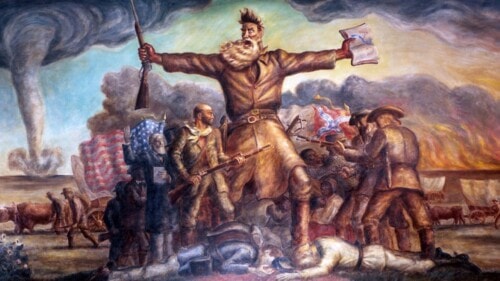Inside KC’s Gun Culture: It’s Changing, and Not How You Might Expect ‘The Gun Conundrum’ Premieres Tonight on Kansas City PBS
Published May 19th, 2022 at 6:00 AM
Above image credit: In this Dec. 21, 2018 photo, a woman takes aim at a target on the shooting range at Frontier Justice in Lee's Summit, Mo. With a women's fashion boutique, small cafe and concierge-style service for VIP members of the on-site shooting range, Frontier Justice offers women and families a shopping experience more tailored to their needs, according to store owner Bren Brown. (AP Photo | Charlie Riedel)Dametria White clutched her paper target, the blue outline of a human form now riddled with bullet holes.
She surveyed the poster-sized proof that her first effort at a shooting range was a success.
“I hit everywhere that I aimed,” White declared as she left Frontier Justice, a gun shop and range in Lee’s Summit.
She was still shaky, unnerved by the experience of pulling the Glock 32’s trigger.
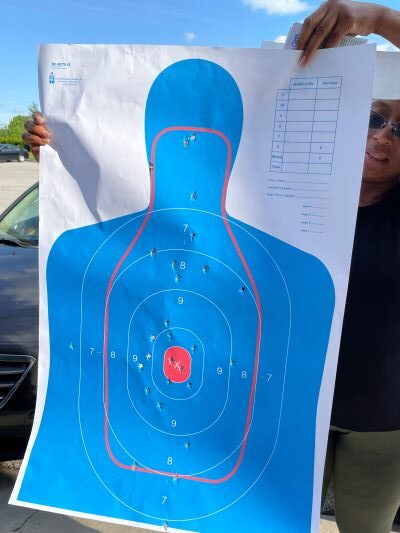
Anxiety aside, White was resolute in her decision. She’ll soon join millions of other Americans who have become first-time gun owners in recent years.
“The days of when you can’t have protection are over,” said White, a mother to two girls.
Too many unhinged “nutcases,” potentially violent people, are roaming society, she said.
As an African American, the prior day’s news merely reinforced her decision to buy a gun.
A lone, heavily armed gunman shot 10 people dead at a Buffalo, New York, supermarket. He arrived wearing body armor, intent on killing Black people, according to police. The mass shooting was quickly labeled a hate crime by law enforcement. And the 18-year-old charged with the murders had intended to slaughter even more Black people at other locations he’d also previously scouted.
White said she plans to train her 15-year-old daughter in gun safety as well.
“Her friends don’t need to know that she has access to it,” White said. “And I want her to know that it’s not a toy.”
Self-protection, surveys show, is the top reason that people are purchasing their first firearm.
About a third of adult Americans own a gun. But the numbers of first-time gun owners increased dramatically in the past few years.
Panic buying defined the buying binge. Purchases were driven by the pandemic, fear of limits on the Second Amendment with a Democrat in the White House, domestic social unrest and even the war in Ukraine.
People increasingly feel unsafe and uncertain. Acquiring a firearm has been their response.
Police, like many civic leaders, are aware of the potential implications. They reassess training to keep up with changes in state laws, mindful of loosening restrictions and other shifts that have added a higher burden of probable cause for officers when interacting with gun owners.
“We saw a huge influx of first-time gun owners over the last few years,” said Sgt. Ward Smith of the Kansas City Police Department.
“People don’t realize that we’ve always taken into account the possibility that people we encounter might be armed,” said Smith, who leads firearms training at the regional academy.
In police training lingo, that’s termed “managing unknown contacts” and involves skills to assess situations, to neither over- nor underreact.
About 7.4 million people bought firearms for the first time between 2019 and 2021, according to a study conducted at Northeastern University and published in the Annals of Internal Medicine.
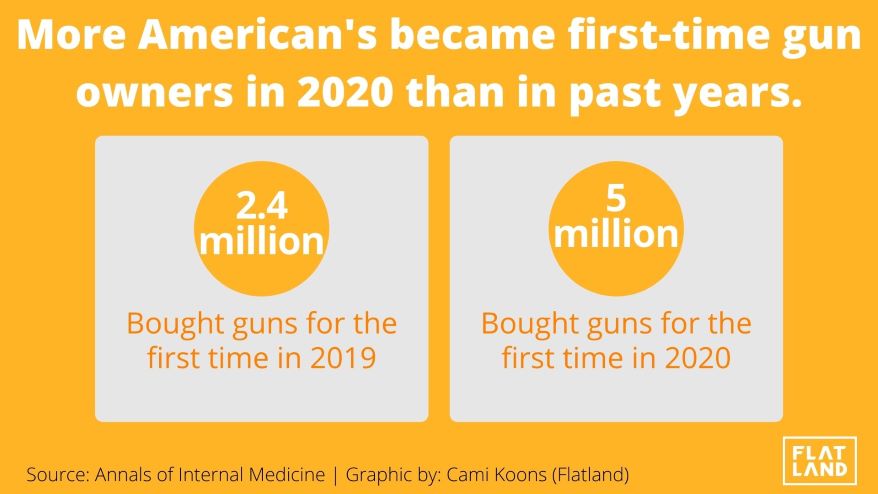
Estimates vary widely because it’s impossible to account for all gun sales given private exchanges of firearms. But between 200 million and 350 million firearms now are in circulation in the U.S.
Surveys also indicate that higher proportions of first-time gun owners are women. Higher proportions are also African American, a counter to the higher percentages of ownership traditionally found among white men living in rural areas.
Another recent trend is an effort to reignite family traditions of hunting and target shooting. The gun industry is especially focused on women, presenting the sport as not only a confidence-building method of self-defense, but a way to enjoy the outdoors.
Adherence to safety is another recurring theme.
It comes in opposition to people who are adamant that more guns equal increased rates of gun violence, increased suicides and more accidental shootings.
Social media is often where divergent beliefs bicker.
Katherine Snow of Kansas City recently got into an exchange on nextdoor.com, challenging the common retort to “get a gun” when someone mentions a car break-in, a porch theft or other threat to safety.
“People have become very scared, very paranoid and hopeless,” she said. “Guns are a symptom.”
They are not, Snow emphasized, really the root of the problem.
The only gun she and her husband of 49 years have ever owned is an inherited family rifle.
A “problem solver by nature,” Snow admits that at this point for American society, “I don’t know how to have fewer guns.”
Other voices argue, ‘Why would that even be a goal?’
More than a few people suggested that the answer to any issues with guns doesn’t lie in taking guns away or, God forbid, undercutting their Second Amendment rights to bear arms.
Rather, infusing a broader nationwide respect for the lethal nature of firearms, including safety training that begins in youth, is a growing focus of many vocal proponents.
Tonight on Kansas City PBS
Panic Purchasing: Black Lives Matter, COVID and Ukraine
Fear and uncertainty fuel gun sales.
Bren Brown ticks off the waves of panic buyers and those who followed.
A savvy businesswoman and co-founder of Frontier Justice, she notes that sales have increased 400% since 2019.
Frontier Justice has two local brick-and-mortar locations, in Lee’s Summit and Kansas City, Kansas, a third location in Omaha and online sales nationally.
Alarmed by the pandemic, the first wave tended to be previous gun owners, who wheeled dollies full of ammunition and other goods out of the stores.
As COVID lingered, and economic uncertainty set in with stalled supply chains, people who’d been on the fence about gun ownership soon purchased firearms.
Another wave happened during and after the Black Lives Matter movement. Middle class people living in the suburbs purchased guns. They feared the protests would spread.
“The police aren’t coming, because they are busy” was a common refrain, Brown said. “And the government is not going to save me if there is a problem.
The election of Joe Biden and fears that the Second Amendment would be undercut with a Democrat for a president, spurred even more buying.
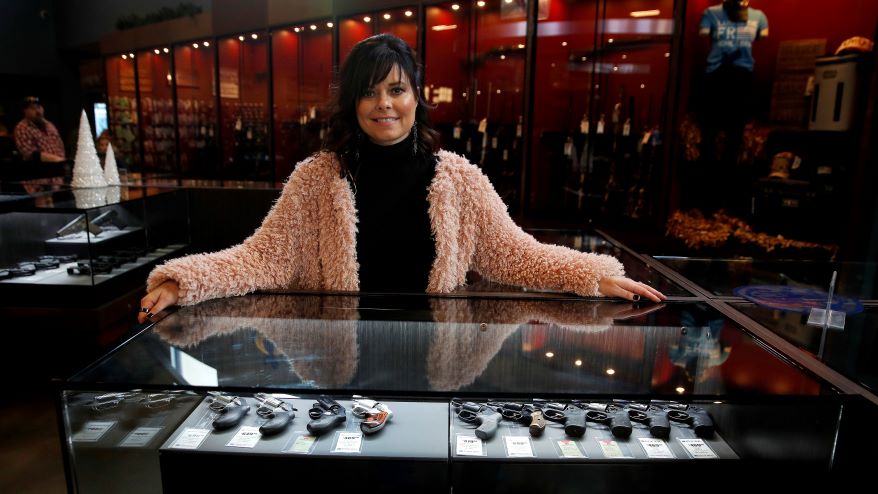
Finally, the Ukrainian War has sparked more sales. Customers could relate because “their cities looked like our cities,” Brown said, and “the people looked like us. They saw real suffering.”
Suddenly, the idea that things could go very wrong in our nation took hold. People who embrace a sense of self-reliance were particularly affected and likely to stockpile in preparation.
“When people felt unsafe, they had a place to find tools to feel safe in their homes,” Brown said of her business, which stresses “Faith Family Freedom” as both a motto and pillars driving every decision.
If this conjures a stereotypical assumption about who are Frontier Justice customers, spend a little time in the store.
A recent Sunday saw two men chatting in Spanish as they browsed. Two African American women patiently waited for their turn to be checked into the shooting range. And an Asian father asked questions of an employee about his purchase as his young son played, counting the toes on a mannequin.
Shooting An AR-15: ‘Exhilarating’
Alex Ragland is newly enthralled with guns.
He didn’t grow up hunting. He has no father-son stories of traipsing through the woods at sunrise to flush game. But after the election of Donald Trump, the openly left-leaning Johnson County resident became more gun curious, musing about the direction of the nation.
Eventually, Ragland found his way to a gun range and rented an AR-15. Boom. He was instantly hooked.
“I had so much fun. It’s extremely exhilarating,” Ragland, of Prairie Village, said. “But I think it is kind of bananas that we are allowed to do it.”
The fact that he wasn’t required to take the safety courses that he was offered (and took) also came as a shock.
Since then, Ragland has purchased three firearms; an AR-15, a Ruger pistol and a shotgun.
He’s also recently discovered trap shooting of clay targets, igniting a whole new passion.
Ragland also was taken aback by the “boilerplate” questions when he registered his guns. Surely, he said, there are ways to not ban guns, but make them harder to get.
“It’s almost a lack of imagination on the part of Democrats,” he said.
Ragland reflects another trend among new gun owners, who tend to take advantage of the many classes offered by Frontier Justice, but also through a range of traveling firearms professionals who often set up sessions in area hotels.
Most are under $100. Such sessions range from “Safe Without A Firearm” and “Safe and Effective Purse Carry” to “AR-15 Basics” and “Kansas and Missouri Concealed Carry Course.”
“There are a lot of ramifications for two people when a bullet leaves a gun,” Brown said.
“There is always going to be a wolf,” Brown said. “We need to be the shepherd, to be great protectors.”
Police Adapt: More Guns, Loosening Laws
Law enforcement officials, well aware more guns are circulating, are tracking the same waves of new purchases that stores tend to note.
In Missouri, some changes for police began about 20 years ago, with a loosening of regulations around concealed carry.
In the past, it wasn’t unusual for police to confiscate a gun, at least temporarily until they could prove ownership, or to ask someone to put it in their trunk or secure it in the household until a situation could be resolved.
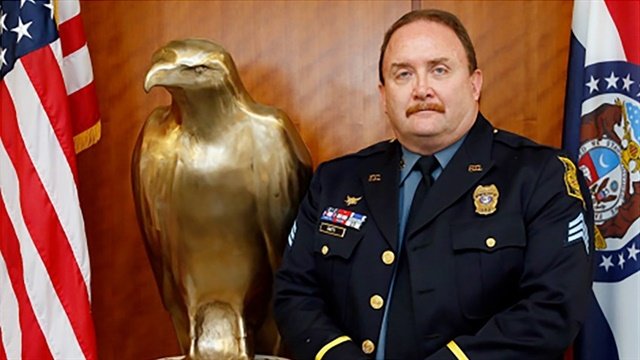
Under the Second Amendment Preservation Act, passed in 2021, there’s a higher burden for officers to justify such requests.
“It did change how we interact with people,” Smith said of the Missouri law that invalidates federal gun laws and is being challenged in court.
Officers could face $1,000 fines and jail time if they exceed the boundaries of the law.
There also is a generational split that 911 dispatchers often manage, Sgt. Smith, of KCPD, said. A caller might alarmingly report that someone is openly carrying a firearm. But the dispatcher will ask more questions to see exactly what is occurring and if the person is presenting a threat to themselves or others.
“People over the age of 40 were brought up with different rules,” Smith said. “They’re still in the mindset, ‘Hey, you can’t carry a gun openly.’ But that’s OK in MO.”
‘Shoot First, Ask Questions Later’
Such loosening of gun laws, without a full account of consequences, is how Jo Ella Hoye cut her political teeth.
Before she became a Kansas state representative, Hoye was part of the uber-diligent throngs of women who make up Moms Demand Action for Gun Sense in America.
They’re part of burgeoning legions of advocates, pushing for what they view as common sense gun reforms.
The organization notes the rising gun ownership rates and counters common thinking, often with research.
“If more guns made us safer, America would be the safest country in the world,” Hoye said. “But we are not.”
She stepped down from local active leadership when she was elected to the District 17, which covers Lenexa.
She’s on a national task force to reform self-defense laws.
Kansas expanded the traditional castle law doctrine, which allows for self-defense with no duty to retreat in your home in 2010. Now, it mirrors states like Florida.
Even in a workplace, lethal force can be used under this version of a stand your ground law, even if someone has a reasonable avenue to walk away.
“We’re emboldening people to be violent and to use deadly force,” Hoye said. “It’s very extreme.”
The Kansas Supreme Court will soon hear a challenge to the law.
I believe there is a need to study this and make a change,” she said. “You can shoot first and ask questions later.”
Bringing Back Hunting
In late April, a massive trailer, a virtual moving container of firearms, archery and gun simulators rolled into Olathe.
Shoot Like A Girl came to Olathe’s Bass Pro Shop.
Karen Butler, a retired U.S. Army civilian employee, started the concept in 2009.
Her divorce undercut her confidence. She felt like she’d failed to provide for her two sons, sharing custody and being miserable when they weren’t with her.
Then she tried archery.
“I found this whole new family of friends. I was a hundred percent in control of what was happening,” Butler said. “I could hit my target. Hitting the ‘x’ was the greatest. It’s as close to perfect as you can get.”
Her confidence grew and she wanted that same sense of achievement to be available to other women, along with the potential to protect themselves against physical dangers. An Alabama-based business was born, with Butler linking with manufacturers and others in the industry to grow the sport.
About 76% of women who come through the trailer commit to buying a firearm within one year.
“We take education so seriously because there are so many new gun owners,” Butler said. “But because of the stigma and negativity surrounding perceptions around firearms, kids aren’t learning what to do if they find a gun.”
That wasn’t a problem for Cierra Black.
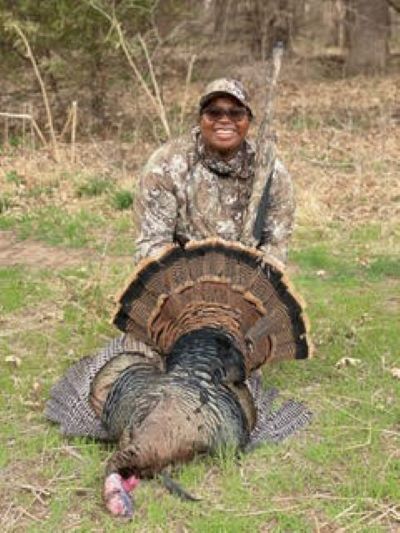
In April, she went on her first turkey shoot. It was held over several days in Clay Center, in Northeast Kansas.
A probation officer in Nashville, she won the trip through Shoot Like A Girl.
She’s in graduate school, studying criminal justice administration. As part of their studies, the class discusses possibilities for making guns less accessible to the violently mentally ill and instituting more required training.
“If more kids were more exposed to the sport side of guns, they would respect it more and understand weapons more,” she said.
Black shot her first rabbit at 11. And for most of her childhood she hunted similar small game with her father.
And until the Kansas trip, Black had no experiences hunting alongside other women. She’s even more vexed to find so few other African American women who hunt. But that might be changing, if new demographics of the sport hold.
The turkey shoot was life changing, she said.
She found herself in a blind with six-time Olympian Kim Rhode, a trap and skeet shooter. Rhode called the turkey in. Black shot it and soon discovered she’d bagged one of the largest turkeys harvested in Kansas this year.
Black’s taxidermy turkey should be delivered by this time next year.
In the meantime, she plans to keep hunting deer.
“I love deer hunting,” she said. “Just getting up early. The peace of just sitting out there in the wild hearing nature calls, seeing the sunrise. It’s just peaceful.”
Mary Sanchez is senior reporter for Kansas City PBS. Flatland’s Cami Koons created the graphics for this story.




